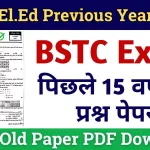Punjab University provides previous papers for M.Tech in Mechanical Engineering (ME) and Nanotechnology (NN). These papers help students understand the exam pattern and key topics.
Reviewing these previous year question papers for punjab university for M.tech can enhance preparation, offering insight into the types of questions asked and aiding in better exam performance
M.TECH-ME (Master of Technology in Mechanical Engineering)
Subject: Advanced Thermodynamics
Question: Define the second law of thermodynamics.
Answer: The second law states that the total entropy of an isolated system can never decrease over time, and is constant if all processes are reversible.
Question: Explain the concept of exergy.
Answer: Exergy is the measure of the maximum useful work obtainable from a system as it reaches equilibrium with its surroundings.
Question: What is the significance of the Carnot cycle in thermodynamics?
Answer: The Carnot cycle represents an idealized heat engine with maximum efficiency, providing a benchmark for real-world engine performance.
Question: Describe the process of entropy generation and its implications.
Answer: Entropy generation occurs due to irreversibilities in a process, such as friction and heat transfer. It leads to a loss of useful energy.
Question: How is Gibbs free energy used to determine spontaneity of a reaction?
Answer: Gibbs free energy indicates spontaneity; a negative value means the reaction occurs spontaneously, while a positive value means it is non-spontaneous.
Question: What is the principle of energy conservation in thermodynamics?
Answer: The principle states that energy cannot be created or destroyed, only transformed from one form to another.
Question: Explain the concept of a thermodynamic system and its types.
Answer: A thermodynamic system is a quantity of matter or a region in space under study. Types include isolated, closed, and open systems.
Question: What is the role of the Helmholtz free energy in thermodynamics?
Answer: Helmholtz free energy is used to determine the work obtainable from a system at constant temperature and volume.
Question: Describe the term “enthalpy” and its significance.
Answer: Enthalpy is the total heat content of a system, used in calculations involving heat transfer at constant pressure.
Question: How does the concept of phase equilibrium apply in thermodynamics?
Answer: Phase equilibrium refers to the state where multiple phases exist together without changing over time, with each phase having equal chemical potential.
[save_as_pdf_pdfcrowd]
M.TECH-NN (Master of Technology in Neural Networks)
Subject: Neural Network Fundamentals
Question: What is a neural network?
Answer: A neural network is a computational model inspired by the human brain, consisting of interconnected nodes (neurons) that process information.
Question: Explain the concept of backpropagation in neural networks.
Answer: Backpropagation is a training algorithm used to minimize the error in neural networks by adjusting the weights through gradient descent.
Question: What are activation functions and why are they important?
Answer: Activation functions introduce non-linearity into the network, enabling it to learn complex patterns. Common examples include ReLU, sigmoid, and tanh.
Question: Describe the architecture of a convolutional neural network (CNN).
Answer: A CNN consists of layers like convolutional layers, pooling layers, and fully connected layers, designed for processing grid-like data such as images.
Question: What is the purpose of dropout in neural networks?
Answer: Dropout is a regularization technique that prevents overfitting by randomly dropping units during training, forcing the network to learn robust features.
Question: Explain the concept of a recurrent neural network (RNN).
Answer: An RNN processes sequential data by maintaining a hidden state that captures information about previous inputs, making it suitable for time series and natural language processing tasks.
Question: What are the vanishing and exploding gradient problems?
Answer: These problems occur during backpropagation in deep networks, where gradients become too small or too large, hindering effective learning.
Question: Describe the use of an autoencoder.
Answer: An autoencoder is used for unsupervised learning, compressing input data into a lower-dimensional representation and then reconstructing it.
Question: What is the significance of learning rate in neural network training?
Answer: The learning rate determines the step size for weight updates. A too-high learning rate can cause instability, while a too-low rate can slow convergence.
Question: Explain the concept of transfer learning.
Answer: Transfer learning involves using a pre-trained model on a new, related task, allowing for faster training and improved performance with limited data.
[save_as_pdf_pdfcrowd]
Punjab University Exam Pattern for M.Tech in Mechanical Engineering (ME) and M.Tech in Nanotechnology (NN)
M.Tech in Mechanical Engineering (ME)
Exam Structure:
- Duration: 2 years (divided into 4 semesters)
- Subjects Covered: Advanced topics in Mechanical Engineering such as Applied Mechanics, Thermodynamics, Fluid Mechanics, Manufacturing Processes, and Design of Machines.
Assessment:
- Internal Assessments: Assignments, quizzes, presentations, and lab work.
- End-Semester Exams: Comprehensive exams held at the end of each semester.
End-Semester Exam Pattern:
- Type of Questions:
- Multiple Choice Questions (MCQs)
- Short Answer Questions (SAQs)
- Long Answer Questions (LAQs)
- Numerical Problems
- Total Marks: Each paper generally carries 100 marks.
- Duration: 3 hours per paper.
- Passing Criteria: Minimum 50% in each paper and aggregate 50% in all subjects combined.
M.Tech in Nanotechnology (NN)
Exam Structure:
- Duration: 2 years (divided into 4 semesters)
- Subjects Covered: Advanced topics in Nanotechnology such as Nanomaterials, Nanophysics, Nanobiotechnology, Nanoelectronics, and Nanofabrication Techniques.
Assessment:
- Internal Assessments: Assignments, quizzes, presentations, and lab work.
- End-Semester Exams: Comprehensive exams held at the end of each semester.
End-Semester Exam Pattern:
- Type of Questions:
- Multiple Choice Questions (MCQs)
- Short Answer Questions (SAQs)
- Long Answer Questions (LAQs)
- Numerical Problems
- Total Marks: Each paper generally carries 100 marks.
- Duration: 3 hours per paper.
- Passing Criteria: Minimum 50% in each paper and aggregate 50% in all subjects combined.
General Guidelines:
- Attendance: A minimum of 75% attendance is required to be eligible for the examinations.
- Practical Exams: Practical examinations are integral, with assessments based on lab performance and reports.
- Internal Assessments: Regular participation and timely submission of assignments are crucial as they significantly contribute to the final grades.
- Re-evaluation: Students can apply for re-evaluation of their answer scripts if dissatisfied with the results, subject to the university’s rules and deadlines.
Punjab University Exam Syllabus for M.Tech in Mechanical Engineering (ME) and M.Tech in Nanotechnology (NN)
M.Tech in Mechanical Engineering (ME)
Semester I:
- Advanced Thermodynamics:
- Laws of Thermodynamics
- Entropy and Exergy Analysis
- Thermodynamic Cycles
- Advanced Fluid Mechanics:
- Fluid Statics and Dynamics
- Boundary Layer Theory
- Turbulent Flow
- Finite Element Methods:
- Introduction to FEM
- Application to Solid Mechanics
- Heat Transfer and Fluid Flow
- Elective I:
- Choose from topics like Robotics, Advanced Manufacturing Processes, or Mechatronics.
Semester II:
- Advanced Heat Transfer:
- Conduction, Convection, and Radiation
- Heat Exchangers
- Boiling and Condensation
- Mechanical Vibrations:
- Free and Forced Vibrations
- Damping and Resonance
- Vibration Control
- Computer-Aided Design (CAD):
- CAD Tools and Techniques
- 3D Modeling
- Design Optimization
- Elective II:
- Choose from topics like Renewable Energy, Advanced Materials, or Industrial Automation.
Semester III:
- Advanced Machine Design:
- Design Principles
- Fatigue and Fracture Mechanics
- Optimization Techniques
- Elective III:
- Choose from topics like Computational Fluid Dynamics, Smart Materials, or Tribology.
- Research Methodology:
- Research Techniques
- Data Analysis
- Technical Writing
- Project Work I:
- Begin research project under faculty supervision.
Semester IV:
- Elective IV:
- Choose from topics like Advanced Control Systems, Biomechanics, or Nanoengineering.
- Dissertation:
- Complete and defend the research project.
M.Tech in Nanotechnology (NN)
Semester I:
- Fundamentals of Nanoscience:
- Introduction to Nanoscience
- Properties of Nanomaterials
- Quantum Mechanics Basics
- Nanomaterials:
- Synthesis of Nanomaterials
- Characterization Techniques
- Applications of Nanomaterials
- Nanofabrication Techniques:
- Top-down and Bottom-up Approaches
- Lithography Techniques
- Self-assembly Processes
- Elective I:
- Choose from topics like Nanoelectronics, Nanobiotechnology, or Nanophotonics.
Semester II:
- Nanophysics:
- Quantum Dots
- Carbon Nanotubes
- Spintronics
- Nanoelectronics:
- Nano-Scale Transistors
- MEMS and NEMS
- Molecular Electronics
- Nanobiotechnology:
- Nanomedicine
- Drug Delivery Systems
- Biosensors
- Elective II:
- Choose from topics like Nanotoxicology, Nanomechanics, or Advanced Nanomaterials.
Semester III:
- Advanced Nanomaterials:
- Synthesis and Properties
- Characterization Techniques
- Applications
- Elective III:
- Choose from topics like Nanostructured Materials, Nanocomposites, or Nanocatalysis.
- Research Methodology:
- Research Techniques
- Data Analysis
- Technical Writing
- Project Work I:
- Begin research project under faculty supervision.
Semester IV:
- Elective IV:
- Choose from topics like Nano-Optics, Nanomagnetism, or Nanotribology.
- Dissertation:
- Complete and defend the research project.
General Guidelines:
- Lab Work: Regular practical sessions and lab work are integral to both programs.
- Seminars and Presentations: Students are expected to participate in seminars and present their research findings.
- Attendance: Minimum 75% attendance is required to be eligible for the examinations.
- Assignments and Projects: Regular assignments and projects must be completed on time as they contribute to the final grades.
Latest Posts
- Step-by-step guide to download and apply for jee mains admit card 202
- Comprehensive 2025 government holidays and recruitment details for job seekers
- JEE Mains Admit Card 2025: Your Step-by-Step Guide to Downloading the Hall Ticket
- Everything You Need to Know About 2025 Government Holidays Recruitment
- Comprehensive Guide to rrb d group recruitment 2025 – Eligibility, Vacancies, and Application
- Detailed guide to nps trust recruitment 2025 vacancies, eligibility and apply process
- Comprehensive guide to hpcl recruitment 2025 notification, vacancies, and application process
- ignou bed admission 2025 complete recruitment guide with eligibility and process
- Comprehensive Guide to Indian Army Agniveer Recruitment 2025 Notification and Jobs
- Everything You Must Know About CBSE Board Exams 2025 Changes & New Rules






